What is Mycoplasma gallisepticum and what symptoms it causes?
Mycoplasma parasites are characterized with the simplest and smallest cell structure and cause serious infection with multiple complications that may persist in the host species. Mycoplasma gallisepticum pathogen is the reason for acute respiratory disease, observed with difficulties in breathing, cough, sneezing, conjunctivitis in chicken. Due to the lack of cell wall, this pathogen shows high percent of heterogenicity which may lead to some issues during the diagnosis of the disease.


How to detect and diagnose Mycoplasma gallisepticum? Pros and Cons of different tests.
It takes more than a week for Mycoplasma gallisepticum to grow in cell culture from chicken isolates. Serologic tests were used, but it needs at least of 1 week after infection for production of antibodies against the mycoplasma’s antigens. These tests are based agglutination and/or hemagglutination inhibition and can take 3 weeks or more to receive correct results. The situation is similar with the developed rapid tests, which essentially utilize the same technology and detect antibodies.

Due to the lower reliability and the long time it takes for a serological test, scientist recommend Polymerase Chain Reaction (PCR) as a rapid and sensitive technique for detection of Mycoplasma gallisepticum. The analysis can be performed for 1 day only and it is the most suitable method for diagnosis of the pathogen. Most PCR assays for detection of Mycoplasma gallisepticum’s DNA are based on the 16S rRNA gene. Some reports described the application of nested PCR test based on GapA gene of Mycoplasma gallisepticum for diagnosis of the disease and isolation of pathogenic DNA. Most laboratories and research institutes use PCR analyses based on detection of genes like mgc2, LP, GapA and l6S rRNA can use in many laboratories for diagnosis of Mycoplasma gallisepticum. The 16S rRNA PCR is a more common technique that is used for isolation and identification of Mycoplasma species not only for M. gallisepticum. The advantages as sensitivity, time effectivity and reliability determine PCR as the best technique for isolation, identification and diagnosis of Mycoplasma gallisepticum in clinical laboratories.

